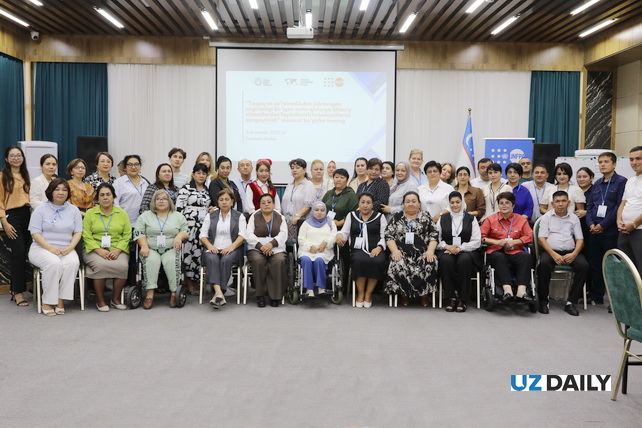
Training for NGOs on Expanding Access for Women and Girls with Disabilities to Social Services Launched in Tashkent
Training for NGOs on Expanding Access for Women and Girls with Disabilities to Social Services Launched in Tashkent
Tashkent, Uzbekistan (UzDaily.com) — On 4 September 2025, a three-day training for representatives of non-governmental organizations (NGOs) supporting people with disabilities and defending their rights began in the capital.
The event was organized by the UN Population Fund (UNFPA) under the Joint UN Program “Reforming the Social Services Delivery System in Uzbekistan: Implementing a Human Rights-Based Approach for Children, Youth, Women, and Men with Disabilities.” The program is funded by the Global Disability Fund (a UN Partnership for Disability Rights) and implemented in cooperation with the National Agency for Social Protection under the President of the Republic of Uzbekistan and the Association of Persons with Disabilities of Uzbekistan.
The training aims to strengthen the capacity of NGOs to provide inclusive and gender-sensitive social services to women and girls with disabilities who have experienced violence and discrimination. This event builds on a May 2025 training and is designed to deepen knowledge and promote practical experience exchange among organizations to ensure sustainable development of their activities.
During the program, participants will:
- Deepen their understanding of the causes, forms, and consequences of gender-based and domestic violence;
- Examine the intersection between disability and gender-based violence;
- Study the existing system for providing social services to women with disabilities who have experienced violence and discuss ways to improve it;
- Familiarize themselves with international and national legal standards and inter-agency cooperation practices;
- Define the role of NGOs in preventing violence and assisting survivors;
- Develop proposals for creating networks and partnerships to protect women and girls with disabilities.
More than 30 NGO representatives from different regions of the country are participating in the training.
Through interactive sessions, they are practicing skills for identifying cases of violence, referring survivors to relevant services, and developing individualized support plans.
Matlyuba Umurzakova, Deputy Representative of UNFPA in Uzbekistan, addressed participants, emphasizing:
"Our goal is to remove all barriers for women and girls with disabilities. Together with NGOs, we are opening access to services and creating a reliable support system in the fight against violence."
At the conclusion of the training, participants will receive certificates and jointly prepare recommendations to expand NGO collaboration with government agencies and promote social partnerships.